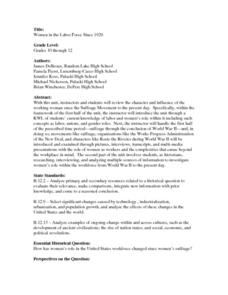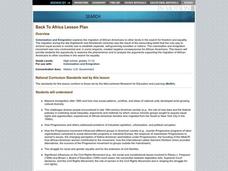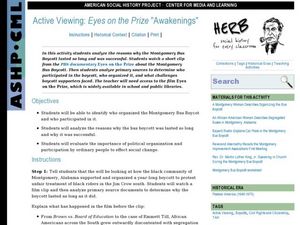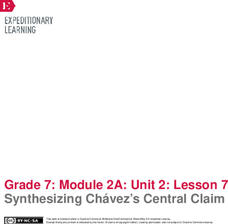Curated OER
The Abolitionist Movement: A Fight for Freedom
Sixth graders investigate the Civil War by identifying famous figures of the era. In this slavery abolitionist lesson, 6th graders read a text on the history of the Civil War and discuss heroes of the era such as Harriet Tubman and John...
Curated OER
Women In The Labor Force Since 1920
Students investigate the historical perspective of how women were perceived in the labor force since 1920 forward. They conduct research that focuses on how the role of women has changed in different periods of time. They identify the...
Curated OER
History of American Child Labor
Learners study the historical and social issue of child labor. They examine the photographs of Lewis Hine to see evidence of child labor and decide how the photographs depict the historical impact of the practice. They write a letter to...
National Endowment for the Humanities
"Sí, se puede!": Chávez, Huerta, and the UFW
"Sí, se puede!" Cesar Chavez and Dolores Huerta believed organizing farm workers and changing their working conditions were possible. Scholars examine provisions of the Bracero Program, videos, and the United Farm Workers' (UFW) work....
DocsTeach
Confronting Work Place Discrimination on the World War II Home Front
Before the Civil Rights Movement was in full swing, FDR's executive order helped promote fair employment. The activity uses primary documents to explore FDR's executive order to help minorities gain equal employment and pay during the...
New York State Education Department
US History and Government Examination: June 2010
Just how successful were the reform movements of the ninteenth and twentieth centuries? Using documents ranging from the writings of Mother Jones to the marriage vows of Lucy Stone, individuals consider the question in a scaffolded...
EngageNY
Reading Closely and Introducing Rhetoric Toolbox: Unions as Agents of Change—Part 1
Scholars explore the question of whether labor unions are the agents of change as they continue reading César Chávez's 1984 speech, "Address to the Commonwealth Club of California." They discuss rhetoric in Chávez's speech and discover...
Curated OER
The Significance of Labor Day
Labor Day provides a way to introduce students to the issues of the labor movement.
PBS
Women's History: Glass Windows; Glass Ceilings
Discover stories about women's history in beautiful stained glass windows. The second in a three-part series teaches scholars about a famous artistic style of stained glass windows and the influential women that used art to impact...
Curated OER
Reforming the Industrial World: The Industrial Revolution leads to economic, social, and political reforms.
The Industrial Revolution brought many changes to American and European economy and politics. Cover the causes and effects of social reforms after the rise of Industrialization. Topics include laissez-faire, economics, socialism,...
PBS
Hidden Messages in Spirituals
Slaves laboring in the cotton fields of the old South singing joyously may have convinced overseers that their workforce was happy and content, but in truth, these spirituals contained secret codes. After viewing a short video about...
Curated OER
Hoboes on Harvest
Learners discover details about the involvement of labor unions in organizing hoboes. In this Great Wheat Harvest Migration lesson, students read the Hoboes on Harvest handout and respond to the provided discussion questions based on the...
Curated OER
Back To Africa
Students analyze the massive immigration after 1850 and how new social patterns, conflicts, and ideas of national unity developed amid growing cultural diversity, and how the Progressive movement influenced different groups in American...
Curated OER
Hoboes on Harvest
Students study the role Oklahoma's wheat fields played in the history of labor movements in the US. They write imaginary letters describing their experiences on a wheat harvest. They research on the internet or in encyclopedias to find...
Curated OER
Arkansas and the Civil Rights Movement
In this Arkansas reading comprehension learning exercise, learners read a 2-page selection regarding the state and the Civil Rights Movement and they answer 10 true or false questions pertaining to the selection.
Stanford University
United Farm Workers
What do primary sources tell people about important events in history? The assessment geared toward high school social studies focuses on primary sources. Learners analyze a poster and a blueprint to determine how the documents...
Curated OER
The Muckrakers Interdisciplinary Unit
Eighth graders complete an Interdisciplinary Unit on the Muckrakers and the Progressive Movement. Students describe life in America and how Progressive Reformers changed it. identify specific problems and propose solutions. Students...
Curated OER
Active Viewing: Eyes on the Prize "Awakenings"
Dive deeper into the Montgomery Bus Boycott with this multi-stage lesson plan, centered on the essential question: Why did the boycott last so long? Historians investigate the Jim Crow south through a video clip (not included), then...
Alabama Department of Archives and History
"Scottsboro Boys": A Trial Which Defined an Age
Here's a must-have resource. Whether your focus is racism, the Great Depression, the "Scottsboro Boys" trial, or part of a reading of To Kill A Mockingbird, the information contained in the seven-page packet will save hours of...
PBS
The March on Washington and Its Impact
High schoolers read Martin Luther King, Jr's speech that he gave in Washington. They identify the social conditions that led to the civil rights movement. They discuss the significance of the March on Washington.
National Woman's History Museum
Dolores Huerta: The Life and Work of a 20th Century Activist
Extra! Extra! High schoolers read about Dolores Huerta, the social activist who helped organize the United Farm Workers. Researchers read primary and secondary sources about Huerta's work and craft a headline, supported by three pieces...
EngageNY
Synthesizing Chávez’s Central Claim
Class members play an interactive game, matching strips of paper containing rhetorical devices with examples from César Chávez use rhetoric in his 1984 speech, "Address to the Commonwealth Club of California." Next, partners discuss...
Curated OER
Woody Guthrie: Ain't Got No Home
Students examine the music of Woody Guthrie and how the political and economic climate influenced his work. They read and discuss online articles, define key vocabulary words, take a Political Orientation Survey, and write a position...
National Endowment for the Humanities
Women's Lives Before the Civil War
Women's lifestyles before the Civil War made a huge impact as a point of causation. Give middle schoolers the opportunity to view firsthand the lives of women before the Civil War. They analyze primary source documents, view photographs,...

























